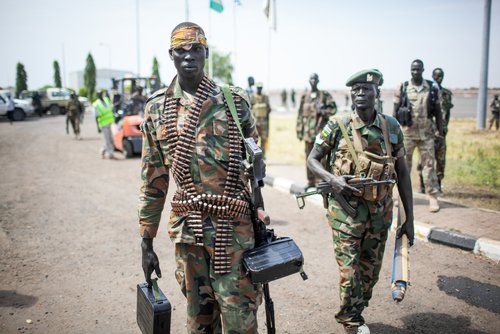Sudan has been in turmoil since an uprising overthrew its long-time autocratic ruler Omar al-Bashir in 2019. Today’s protests are led by the Resistance Committees, a grassroots group that has steadfastly rejected any negotiations with Sudan’s military leaders, Gen. Abdel-Fattah Burhan and Gen. Dagalo.
Despite the political and social upheaval, there are some who staunchly support the current political regime in recent years.
Saudi Arabia and the United Arab Emirates (UAE) have increased their military presence and influence throughout the Middle East and Africa. The creation of a military alliance with Sudan has been one of the most important events in this respect.
After failing for years to persuade former Sudanese President Omar al-Bashir to join their axis, the UAE and Saudi Arabia used the 2018-2019 revolution to bring Sudan under their control. They have accomplished this by providing backing to military and paramilitary figures in the name of “stability” and coopting portions of the revolutionary coalition.
The generals were emboldened by Emirati and Saudi support for the Transitional Military Council (TMC) that replaced al-Bashir in the critical weeks that followed his downfall, allowing the TMC to repress demonstrators on 3 June 2019. This stifled revolutionary demands for civilian rule and allowed for the emergence of a power-sharing agreement in which the generals play a dominant role.
Due to Sudan’s dire economic situation, international support will be required not only to assist soldiers and rebels in laying down their arms, but also to underwrite the government’s spending commitments in the periphery.
A Red Sea Hub
The alliance has also led to increased economic ties between the three countries. Saudi Arabia and the UAE are both important investors in Sudan, with the two countries offering economic aid in exchange for military assistance. With the formation of collaborative businesses and investments, the alliance has also permitted increased trade between the three countries.
One of the major paradoxes of the region though is that the Halayeb Triangle, the Sudanese territory occupied by Egypt in 1995, is mined and “financially exploited” by the UAE. The UAE operates in a bufferzone as a broker for peace between the two sides, having created something akin to an overseas economic zone for Emirati companies.
In addition, the Gulf states could not tolerate the increased Chinese influence in the region and therefore financed large development projects in recent years. However, in order for there to be substantial trade, the necessary infrastructure must also exist.
Thousands of jobs are being created due to construction projects, bringing also South Asian cheap workforce to the country, through the Gulf companies.
Sudan struck a $6 billion agreement last year with a consortium led by the AD Ports Group and Invictus Investment of the United Arab Emirates to create a new port and industrial zone in the Red Sea.
“This mammoth project, estimated to cost around $6 billion, will give a powerful boost to the national economy and bring countless benefits to the country as a whole,” said Sudanese Finance Minister Gibril Ibrahim.
Sudan’s exports to the UAE amounted to $1.86 billion in 2020, while the UAE exported $1.14 billion worth of goods to Sudan in the same year.
Military Framework
The Emiratis have financed a peace process that prioritizes the generals. In February 2020, the leader of the sovereignty council, Gen. al-Burhan, met with Israeli Prime Minister Benjamin Netanyahu to explore normalization of bilateral ties. The move won al-Burhan an invitation to Washington from US Secretary of State Mike Pompeo, which perplexed American observers because it looked to contradict US doctrine of supporting civilian authority.
The alliance between Saudi Arabia, the UAE, and Sudan has its roots in the ongoing conflict in Yemen. Saudi Arabia and the UAE are both significant members of the Saudi-led coalition fighting Houthi rebels in Yemen since 2015. Sudan, for its part, has provided troops to the coalition in exchange for economic assistance. The country had as many as 15,000 soldiers deployed there as part of the Saudi and UAE-led coalition fighting the Houthi movement.
The alliance, however, is not restricted to Yemen. It also has far-reaching consequences for regional security and stability. Saudi Arabia and the UAE see themselves as regional bulwarks against Iranian influence, and Sudan is an important partner in this sense. Sudan, which has traditionally maintained close ties with Iran, has recently moved closer to Saudi Arabia and the UAE.
The military alliance formed by Saudi Arabia, the UAE, and Sudan is a significant development in the Middle East and Africa. It reflects Saudi Arabia’s and the UAE’s expanding regional influence, as well as their efforts to resist Iranian influence. However, the partnership raises concerns about human rights violations and the possibility of more war in an already volatile region. Sudan has a long history of political instability and violence, and the military has previously been accused of atrocities.




